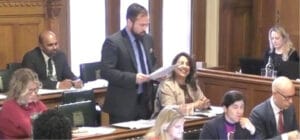
I have been honoured to sit on the Terminally Ill Adults (End of Life) Bill Committee since January 2025, collaborating to work on the momentous piece of legislation. My focus has been making a workable Bill with adequate safeguards.
The last sitting of the Committee took place on the 25th March, 2025, where I spoke at length about my conclusions following the discussions.
My speeches on the 25th March include the following:
“I accept that changes to previous legislation may be required. However, the provision of assisted dying should not amend the foundational principles of the national health service. It should not break with the legacy of Attlee, of Bevan and of Labour. That is why I support amendment (b) to new clause 36.”
“This is not simply a question of principle, or consistency within the Bill; it is about establishing proper accountability for assisted dying.”
“We know that geography and socioeconomic factors render access to healthcare, especially private healthcare, unequal. In oral evidence, Baroness Kishwer Falkner, head of the Equalities and Human Rights Commission, and Fazilet Hadi of Disability Rights UK both explained how the impact of the Bill on an unequal society might cause problems. Baroness Falkner said that
“from what one understands, GP provision and general access to healthcare are poorer where demographics are poorer than it is in the better performing parts of the country. One other factor to consider in terms of a postcode lottery is that people in wealthier parts of the country tend to be more highly represented in private healthcare than in public healthcare and use of the NHS. That also impacts their choices and the care they get.”––[Official Report, Terminally Ill Adults (End of Life) Public Bill Committee, 29 January 2025; c. 181, Q235.]
The system must not only be fair, but be seen to be fair. If we had such a system of private provision in place, public trust would almost certainly fall. We do not have to look far to see what happens if these matters go unaddressed. When we have a lack of oversight and accountability, it is the public who suffer. There have been too many scandals in recent history for us not to recognise that reality.”
“I will vote in favour of amendment (d) to new clause 36. It would remove subsection (6), which says:
“Regulations under this section may make any provision that could be made by an Act of Parliament; but they may not amend this Act.”
It strikes me as dangerous to provide in the Bill for the Secretary of State to amend primary legislation, and we should vote to remove that power. It is surely a weakening of the Bill’s safeguards. Assisted dying must remain firmly in the control of the democratically elected Parliament. I urge Members to join me in voting to remove subsection (6).”